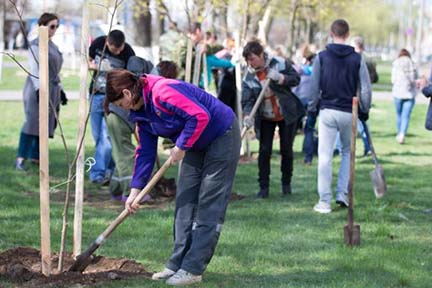
Plant, protect and plan for urban trees with UCF grants
|
|
|||||
|
|||||
|

|
|
|||||
|
|||||
|


Press Release FOR IMMEDIATE RELEASE: Aug. 14, 2023 MEDIA CONTACT: Bob Wheaton, 517-241-2112, WheatonB@ Michigan to keep kids safer by embedding family resource specialists with child protection staff to connect Michiganders to resources LANSING, Mich. – The Michigan Department of Health and Human Services (MDHHS) will keep children at risk of neglect safer by making sure their parents are connected to department programs that can meet their basic needs. MDHHS is announcing the Family Impact Teams project, which embeds family resource specialists with child protection and foster care staff to so they can support families in applying for benefits such as food assistance and Medicaid and connect them to other economic supports. The first phase of the project begins this month. “Many families that come to the attention of the child protection system need help with providing their children with housing, food, health care coverage, quality childcare and other necessities so that they can be safe and healthy,” said MDHHS Director Elizabeth Hertel. “Our family resource specialists can immediately connect them to the resources they need so their families can stay together safely. We must help families who love their children but struggle to meet their needs due to economic instability.” Family Impact Teams are part of MDHHS’s Keep Kids Safe Action Agenda, the department’s ongoing efforts to improve the safety and well-being of Michigan children. Family resource specialists will engage with families face-to-face, determine their eligibility for assistance programs offered by MDHHS, and refer them to other local agencies that can provide them with resources to meet the families’ needs. “One of MDHHS’s top priorities is to remove barriers to family success,” said Lewis Roubal, chief deputy director for opportunity. “Providing additional supports to the families of at-risk children will keep them safer.” The first phase of the project is in the following counties: Allegan, Barry, Chippewa, Grand Traverse, Kalkaska, Leelanau, Luce, Mackinac, Oakland, Sanilac, St. Clair and Wayne. The second phase of the project will roll out statewide throughout 2024. There are 19 Family Impact Teams family resource specialists who are currently being trained. “When family resources specialists visit parents along with Children’s Protective Services or foster care staff, we will provide positive support to families in need by ensuring they have access to economic resources which will help to remove financial barriers. Working with Children’s Services staff, we can provide families the support they need to remain together or the support they need for reunification,” said Amethia Sellers, who will be one of the new embedded specialists in Wayne County. “Having been a part of the foster care system as a child, I had an amazing social work team who made a difference in my life and I too want to have that same impact in the lives of others who are experiencing barriers within their lives.” Sellers has worked for the department as an eligibility specialist for more than three years. She applied for the new position because she is excited to work with families in children services and has a background servicing children in foster care. The Family Impact Teams approach strengthens collaboration between MDHHS’s Economic Stability Administration – which provides public benefits such as food assistance and Medicaid – and its Children’s Services Administration, which protects children and provides services to their families. Providing childcare subsidies decreases child neglect by 31%, according to a study by Chapin Hall at the University of Chicago, while referring homeless families to permanent housing decreases foster care placement by 50% and connecting families to food assistance decreases child maltreatment by 11%. |

Press Release FOR IMMEDIATE RELEASE: August 21, 2023 CONTACT: Chelsea Wuth, 517-241-2112, WuthC@michigan.gov MDHHS renews its partnership to continue providing GetSetUp virtual classes to empower older adults across Michigan LANSING, Mich. – The Michigan Department of Health and Human Services (MDHHS) and GetSetUp, an online learning and discovery platform designed specifically for older adults, has expanded its partnership for the third year in a row to combat social isolation and to keep older adults mentally, physically and socially active by providing Michigan residents age 50 and older an additional 500,000 free virtual classes across a range of topics. MDHHS began partnering with GetSetUp in October 2020 to engage older residents through classes on various topics, and the overall number of classes attended since 2020 recently exceeded 1 million for the state. Programming may be accessed anywhere via smartphones, tablets or computers. For those seeking to learn more about how to use devices to access the resources, GetSetUp offers a selection of classes on topics about how to use smartphones and tablets, as well as how to use popular software programs and apps. “By making programs like GetSetUp available for all residents at no cost, we are making meaningful progress in helping them live happy, healthy and engaged lives,” said Dr. Natasha Bagdasarian, MDHHS chief medical executive. “The classes have had a positive impact on hundreds of residents who now have valuable resources to combat social isolation and access new knowledge, significantly improving their quality of life.” GetSetUp has helped reduced isolation and loneliness by making its services available to the 2.4 million older adults in Michigan:
Michigan residents over age 50 can access the easy-to-use GetSetUp learning platform and participate free of charge in friendly, peer-led classes. Plus, they can join classes to learn about health, wellness and fitness, explore hobbies and much more. “Our ongoing partnership with Michigan demonstrates the transformational impact that can be achieved when organizations come together to address social challenges with accessible, tech-enabled solutions,” said Lawrence Kosick, president and co-founder of GetSetUp.”This is just the beginning, and GetSetUp eagerly looks forward to our new Veterans classes developed with MDHHS to empower an even broader range of older Michigan residents in the years ahead.” Learn more about GetSetUp’s partnership with MDHHS by exploring classes that help empower older adults to learn, connect and thrive at Getsetup.io/partner/Michigan. About GetSetUp GetSetUp is an online community of older adults who want to learn, connect with others and unlock new life experiences. GetSetUp partners with entities such as state and local government agencies, health providers and community organizations to offer live programming taught by peers who are experts in their field, social hours hosted by community members and special events with speakers who directly address areas of interest to older adults. Classes are taught in English, Spanish, Hindi and Mandarin by older adults on a highly interactive, custom-built video platform where participants can connect during and in between classes. With a mission to combat social isolation and empower older adults to learn, connect and thrive, GetSetUp provides accessible and engaging educational experiences that enrich the lives of individuals across the United States. The company’s investors are specialists in the education and AgeTech sectors, including Primetime Partners, ReThink Education and Cowboy Ventures. To learn more, visit Getsetup.io. |

|
|

FOR IMMEDIATE RELEASE Contact: Ron Leix, Treasury, 517-335-2167 Be Alert and Informed When Considering Student LoansCollege Students Can Become Their Own Financial Advocate to Manage and Leverage Financial Aid
LANSING, Mich. – As Michiganders prepare for the upcoming fall semester and pay their college tuition bills, the Michigan Department of Treasury’s MI Student Aid Team is asking students and their families to be alert and informed when considering student loans. “Michigan students and families cover a considerable amount of their higher education costs,” State Treasurer Rachael Eubanks said. “Student borrowers who become their own financial advocate can better understand how to manage and leverage the financial aid they receive. Please carefully consider only accepting those loans that are needed. The choices made by students today could have ramifications later in life.” To make the best decision regarding student loans, the MI Student Aid Team recommends seven best practices when considering student loans:
Individuals nationwide have nearly $1.6 trillion in outstanding student loan debt, according to the Federal Reserve Bank of New York. For more information, go to michigan.gov/mistudentaid |